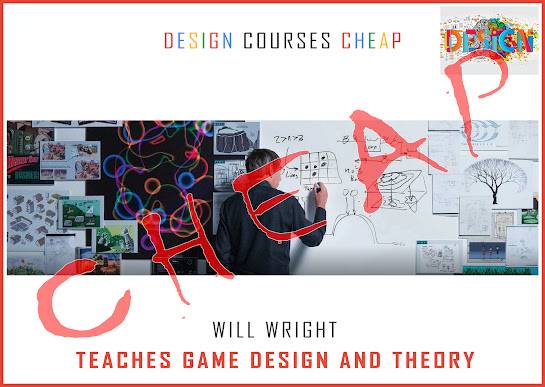What is Will Wright Teaches Game Design and Theory for Cheap?
1. The Fundamentals of Game Design 14:53
Meet your new instructor: Will Wright, visionary game designer behind The Sims. In your first lesson, you’ll learn the core tenets of Will’s multidisciplinary game design process.
2. Generating Game Concepts 12:59
For Will, the natural and social worlds are a rich source of material. Learn what inspired the creation of The Sims and Spore, and how to find and hone your own ideas through wide-ranging research.
3. Early Prototyping 08:39
Rapid prototyping is a central component of Will’s game design process. Explore various types of prototyping and learn how to “find the fun” in the early stages of the design process.
4. The Relationship Between Story and Games 08:00
Games are capable of producing emotions that other media cannot, since they allow players to create their own stories. Will teaches you how to create a sense of agency and responsibility in your players and offer them expressive tools.
5. Exploring Player Psychology 16:52
Will believes game development is as much about programming a player’s brain as it is about programming the game itself. Learn Will’s strategies for creating compelling games that take player psychology into account.
6. Design Player-Centered Experiences 16:16
Will believes that failure is critical to helping players learn, and making failure fun is a key part of game design. Learn how Will keeps players entertained throughout their experience.
7. Develop a Game Language 07:06
Games use a system of signs and symbols to communicate meaning to the player. Will teaches how to create and use your own “game language” to educate players about the rules of your game world.
8. Designing a Visual Aesthetic 11:13
Your visual aesthetic helps define your game language and impacts your overall design. Will shares tips for discovering your own aesthetic and collaborating with art directors and illustrators to achieve your vision.
9. Game Mechanics 14:54
Game mechanics govern the interactions within your game system. Will teaches you how to identify mechanics in other games, and how to choose the game mechanics that will enhance your player experiences.
10. Game Demo: Morey 9:49
Watch while Will shares his insights and perspectives with an aspiring game designer as they review her latest prototype and he gives her suggestions for areas of focus and iteration.
11. Iteration and Scoping 15:59
An iterative process can continually improve your design. Learn Will’s strategies for scoping and iterating, including his helpful “feature triage” method.
12. Prototyping Case Study: Proxi 08:31
Will and his programmer reveal and iterate on prototypes they are developing for their new game, Proxi. Witness how collaboration and prototyping can influence design decisions.
13. Playtesting 19:55
Player feedback is your most valuable resource as a designer, and the playtest is your first chance to get inside your player’s mind. Will teaches you to use playtesting to identify your audience, interpret feedback, and more.
14. Designing a Sound Aesthetic 15:39
Great sound can improve the experience of your game exponentially. Learn how to utilize music and sound design to expand your player’s imagination and heighten their emotional experience.
15. Pitching Ideas 16:45
When it comes to pitching ideas, one size does not fit all. Will shares tips for structuring your initial pitch and modifying your message to connect with diverse audiences.
16. Game Demo: Flooded Market 09:34
Will provides feedback and advice to a game designer who is in the late stages of the game design process.
17. Choosing and Understanding Your Platform 08:40
When deciding what platform your game will use, you’re also deciding which audiences it will reach. Will teaches you what to consider—such as independence, monetization, and hardware—when making this choice.
18. System Design 21:34
Understanding the fundamentals of system design will help you build more robust interactions in your game. Will shares his tips for what to take into account when designing an interactive system for your players.
19. Leadership and Collaboration 09:25
The lead designer sets the tone for the rest of the team and helps ensure a smooth production process. Learn Will’s leadership techniques and why he believes that creating a collaborative environment is so important.
20. The Future of Game Design 08:05
What’s next? Will speculates on the future and advises game designers to stay open-minded in the wake of technological advancements.
21. Final Thoughts
▶️ SAMPLE: https://t.me/examplesdesign/51
▶️ SAMPLE: https://ok.ru/video/3110257887794
▶️ SAMPLE: https://rutube.ru/video/8c0f85a3e66b3985bce33ee3f056c9cc/












Reviews
There are no reviews yet.